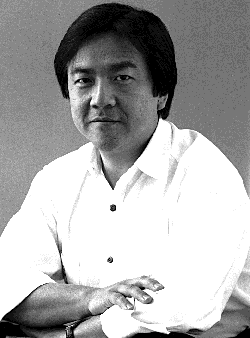GOLDSEA | ASIAMS.NET | ASIAN AMERICAN PERSONALITIES
JAMMING MAN
PAGE 2 of 3
| He has no qualms about reading a book, visiting an art gallery, or even going to a movie during what less open-minded people would call "working hours." |
At the age of nine Kao started a literary magazine at his school "because the school didn't have one." He got the principal to let him use the P.A. system, put together an editorial board, organized a schoolwide contest and launched the Hillside Grade School Inkwell.
"Nobody told me how to do this," he says. "I just kind of figured out that it was more fun being in the principal's office, organizing a contest, than it was learning whatever I was supposed to be learning in fourth grade. And that's pretty much been par for the course all the way through."
At Yale Kao double-majored in philosophy and behavioral science. He then entered medical school, in no small part because his father was an M.D.-Ph.D. and John was his only son. It was to be expected. But he managed to do it in a way that jibed with his own interests.
"My modus operandi," Kao explains, "was not to go head to head with my parents but to adapt what they had in mind to what I had in mind, so that the result would be a kind of amalgam of both." In this case, the amalgam was Jungian psychoanalysis, the study of which would satisfy his parents' wish that he get an M.D. and his own interest in human behavior.
Kao loved medical school, but he realized toward the end of his residency at Harvard that he wasn't interested in the kinds of jobs to which his education was leading him. For him, medical school was a path of knowledge, not a career choice. So he worked out a deal with Harvard allowing him to enroll in the business school while he was still finishing up his residency in psychiatry. At the time he had a vague idea of using his psychiatric training to help companies or CEOs, or "people who were developing new things." He also had an interest in producing movies, and he thought the business knowledge, combined with the knowledge he already had of consumer psychology, would give him the edge he needed there.
Kao received his MBA in the spring of 1982 and started teaching at Harvard two weeks later. Within two years he had carved out his niche as "the creativity person" on the faculty. It was a remarkably fast rise in a notoriously staid and traditional institution. But Kao was never one to rest on his laurels. After teaching creativity for a couple of years, he decided it was time to go into the actual business of creating.
"I realized it was a good opportunity to incubate ventures," he recalls. "And that I could not only think about them, but I could actually do them."
In 1986 Kao happened upon some interesting work being done by Howard Green, a professor at the Harvard Medical School who was growing sheets of skin for burn victims. Kao immediately saw the potential for bio-tech factories manufacturing not just skin but cartilage and other kinds of human tissue for every kind of replacement procedure.

"I did everything," Kao recalls of the company he launched. "I wrote the business plan, I raised the money, I recruited a CEO, I kind of whipped it all together--and then there was this magical day when we had money in the bank and investors and a management team, and I walked into this lawyer's office and signed my name 400 times, and we had a company." Biosurface Technology was ultimately purchased by Genzyme, a large Boston-based biotechnology firm that saw the potential to form a total-approach wound-care division through their combined resources and expertise. It is not unusual for promising small biotech firms with a proven product to be purchased by larger companies. Renamed Genzyme Tissue Repair, the $7.5 million NASDAQ company is currently poised to revolutionize treatment of knee injuries with a cartilage-growing product called Carticel that could obviate the need for knee replacements.
Since that first entrepreneurial success Kao has founded numerous start-ups. Another biotech company, originally called K.O. Technology and now going by the name Variagenics, is working toward a completely new approach to cancer treatment. It is still in the research phase, but expects to have a drug on the market in seven to ten years that will attack cancer cells without inflicting damage on normal cells. Kao is also the founder of a company called Advanced Video Communications, which is also in the research and development phase. Its product will be cutting-edge multimedia communications technology for the Worldwide Economic Forum, a prestigious international membership organization that brings together world leaders in business, government and academia. Currently, Kao is at work on a company that will provide physical environments, technology-based tools and advanced training methods to firms that wish to put into practice the creativity principles outlined in Jamming. Tentatively called The Idea Factory, it is scheduled to launch next year.
You need only four things to start a company, according to Kao: capital which, he says, is easy to find if you have a good idea, people who will turn the cause into a passion, a well thought-out business plan and "chef's skills"--"the ability to preside over the process by which the ingredients are transformed from separate elements into a cohesive whole." Kao doesn't mention the entrepreneurial spirit--the desire and courage to create something new. That trait is an innate part of Kao's being. PAGE 3
| PAGE 1 | 2 | 3 | EXCERPT FROM KAO'S BOOK |
CONTACT US
|
ADVERTISING INFO
© 1996-2013 Asian Media Group Inc
No part of the contents of this site may be reproduced without prior written permission.
